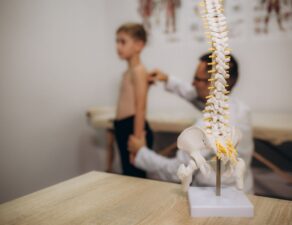
Scoliosis, a condition characterized by an abnormal curvature of the spine, has been a topic of medical research and discussion for decades. If you’re wondering if scoliosis is genetic, we’ll delve deep into the genetic factors associated with scoliosis and explore the latest research findings on this topic.
What is Scoliosis?
Scoliosis can manifest in various forms, from mild curves that may go unnoticed to severe spinal deformities that can impact daily life. The condition can develop at any age, but it’s most commonly diagnosed during adolescence.
The Genetic Link
The question of whether scoliosis is genetic has intrigued researchers for years. While the exact cause of scoliosis remains unknown, several studies suggest a genetic predisposition to the condition. Here’s what the research says:
Family History
It’s not uncommon for multiple members of the same family to be diagnosed with scoliosis. This familial trend indicates a potential genetic link. If a parent or sibling has scoliosis, the chances of another family member developing the condition are higher than in families with no history of the disease.
Genetic Research
Advances in genetic research have identified certain genes that may be associated with the development of scoliosis. However, it’s essential to note that the presence of these genes doesn’t guarantee the onset of the condition. Instead, they may increase the susceptibility to scoliosis when combined with other environmental or developmental factors.
Twin Studies
Studies involving identical twins, who share 100% of their genetic material, have provided valuable insights. If one twin develops scoliosis, the likelihood of the other twin also having the condition is significantly higher than in non-identical twins or siblings.
Environmental and Developmental Factors
While genetics play a role in scoliosis, they aren’t the sole factor. Environmental and developmental factors can also influence the onset and progression of the condition. For instance, certain injuries, infections, or nutritional deficiencies during crucial developmental stages might increase the risk of scoliosis, even in individuals with no genetic predisposition.
Conclusion: A Combination of Factors Contribute to Scoliosis
So, is scoliosis genetic? The answer is both yes and no. While there’s a clear genetic component to the condition, it’s not the only factor at play. A combination of genetic, environmental, and developmental factors determines the risk of developing scoliosis.
Consult with Dr. Siambanes at Scoliosis Care
Understanding the genetic factors of scoliosis can be complex, but you don’t have to navigate it alone. Dr. Siambanes at Scoliosis Care is dedicated to providing expert insights and comprehensive care for those affected by scoliosis. With years of experience and a patient-centered approach, Dr. Siambanes is a trusted resource for individuals and families seeking answers and treatment options. If you or a loved one is grappling with scoliosis, reach out to Scoliosis Care for guidance and support.








